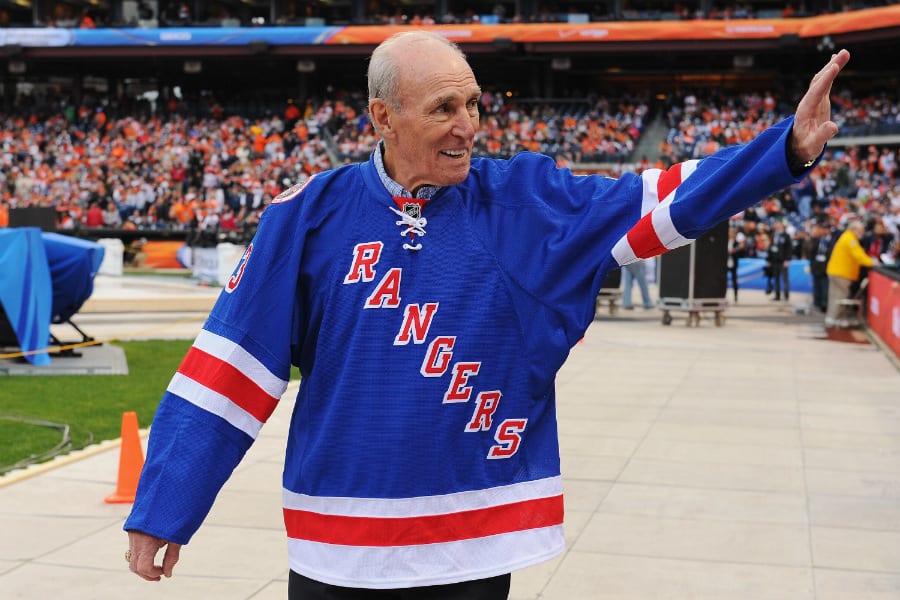A dedicated defenseman who was one of the true nice guys of the game, Harry Howell battled on bluelines for bad teams for much of his career before finally finding his place on the Stanley Cup as a scout with the dynasty-era Edmonton Oilers.
Harry Howell|Brian Babineau/NHLI via Getty Images
When Harry Howell finally got his name on the Stanley Cup as a scout with the Edmonton Oilers in 1990, there was not a person in hockey who more deserved to have his name etched on that chalice. And judging by the accolades that poured in from former teammates and opponents alike after Howell died Sunday, there weren’t many more congenial people to win it.
Yes, when Howell won that Cup with Edmonton it proved once and for all that nice guys don’t always finish last. It’s a testament to Howell that he managed to win a Norris Trophy – becoming the last man to win it in the Original Six era – and be inducted into the Hockey Hall of Fame despite playing for god-awful teams throughout his career.
Think about this for a minute. Howell played 21 full seasons in the NHL, encompassing 1,411 regular-season games, and never played for a team that made it out of the first round of the playoffs, not once. Seventeen of those seasons were spent with the moribund New York Rangers and the other four with the Oakland Seals and Los Angeles Kings. Of the 21 years Howell played, he made the playoffs in only eight of them. How bad were the Rangers? Well, goalie Gump Worsley, who broke into the NHL with Howell in 1952 and played 10 seasons with him, was once asked which team in the NHL gave him the most trouble. Without hesitation, Worsley cracked, “The Rangers.â€
No player in NHL history played as long as Howell did with such little playoff success. (In his three years in the World Hockey Association, Howell did manage to make it out of the first round once, in 1975 with the San Diego Mariners.) For a guy who won a Memorial Cup in 1950 with the Guelph Biltmores, then scored a goal in his first NHL game, nobody could have seen that coming. Howell sits 36th all-time on the league’s games played list. Of the 35 players before him, the only one who has not won a Stanley Cup is Patrick Marleau, who made it out of the first round with the San Jose Sharks a total of 10 times.
Despite the lack of talent around him, Howell never complained about his lot in life. In fact, he took an enormous amount of pride in playing for the Rangers. A steady stay-at-home defender, Howell was never known for putting up gaudy offensive totals, but registered career highs in both goals (12) and points (40) in the 1966-67, in part because he played the point on the Rangers’ power play alongside Bernie ‘Boom-Boom’ Geoffrion. Howell picked up his only Norris Trophy that year at the age of 33. During his acceptance speech he remarked that he was happy to win the award because he predicted Bobby Orr would have a monopoly over it for the next decade, which is exactly what happened. It was only fitting that Howell was inducted into the Hall of Fame alongside Orr (and Henri Richard) in 1979, which represents one of the strongest induction classes in history.
He also received personal recognition in 2014 when Canada Post issued a set of stamps featuring legendary defensemen of the Original Six era that highlighted him along with Tim Horton, Pierre Pilote, Red Kelly, Doug Harvey and Orr. That same year, the North Wentworth Twin Pad in Howell’s hometown of Hamilton, Ont., was renamed the Harry Howell Arena.
Howell became the GM of the Cleveland Barons and later became the chief scout with the Minnesota North Stars when the two teams merged. He finally experienced some team success as an assistant coach with Canada’s bronze medal-winning team at the 1978 World Championship. He was hired by the Oilers as a scout in 1989, just in time to be part of the last Cup of the Oilers dynasty.
As much as Howell was a great player, he was even a better person. During his scouting years he was often a fixture in the press box at Toronto Maple Leaf games and was unfailingly polite and courteous. Players who played with him described him as an outstanding human being. “He was one of the kindest men I’ve ever met,†Hall of Fame defenseman and former teammate Brad Park told Scott Radley of the Hamilton Spectator.
Howell suffered for a number of years from Alzheimer’s disease and died just three weeks after Marilyn, his wife of 64 years. For a man who was as loyal and devoted as Howell was, perhaps that should not come as a huge surprise.



